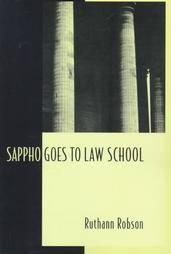Sappho Goes to Law School: Fragments in Lesbian Legal Theory
Ruthann Robson
Included are essays on lesbians and criminal justice, same-sex marriage, child custody cases, and the role of personal experience in postmodern theorizing. In her provocative closing essay, ‘Lesbian Sex in a Law School Classroom,’ Robson describes the difficulties of teaching a course entitled ‘Sexuality and the Law’ to a diverse group of students, some of whom object to the word ‘sex’ appearing on their law school transcript, while others cannot help but unburden their private lives to her during her office hours. With its multitude of stories and its playful ambivalence toward personal narrative, even the theory-weary will find Sappho Goes to Law School stimulating and unusual. –Regina Marler
—–
From Library Journal
The legal status of lesbians and gay men in contemporary America continues to be controversial, as illustrated by these two very different titles, both by professors of law. Richards aims to combine ‘interpretive history, political philosophy, and constitutional argument to make sense of the background, development and growing impact of two of the most important movements of human rights currently on the American constitutional scene: feminism and gay rights’ and ends by claiming to have explored ‘the interpretive fertility of antebellum abolition feminism in both the understanding and criticism of contemporary interpretive developments in the areas of gender and sexual preference.’ His analysis, however cogent, is undermined by a downplaying of lesbians in the title and elsewhere, a problematic conceptualization of ‘moral slavery,’ and Richards’s often nearly impenetrable prose. In contrast, the rhetorical proposition in the title of Robson’s exploration of lesbians and the legal machine is pointedly provocative and witty as well. This challenging collection of 13 essays can be read as a continuation of her previous book, Lesbian (Out)Law: Survival Under the Rule of Law (LJ 6/1/92). Applying queer theory to her examination of the legal system and legal theory to the concept of lesbianism, Robson confronts the complexities of such issues as lesbian identity, class, violence, marriage, and parenting. The writing, a heady mix of pedagogy, lesbian sex, and jurisprudence, is dense and iconoclastic but always intellectually stimulating, ultimately rewarding the reader who perseveres: ‘But in addition to their danger, both essentialism (modernism) and constructionism (postmodernism) present possibilities for an emancipatory enterprise such as a lesbian legal theory.’ If 70 pages of endnotes seems excessive, it only reinforces the notion that these titles are intended for subject collections.?Jim Van Buskirk, San Francisco P.L.
Copyright 1998 Reed Business Information, Inc.
Check for it on:
Details
| ISBN | 231105614 |
| Genre | Legal |
| Publication Date | Jul-98 |
| Publisher | Columbia University Press |
| Format | Trade Paperback |
| No. of Pages | 320 |
| Language | English |
| Rating | NotRated |
| BookID | 11037 |
